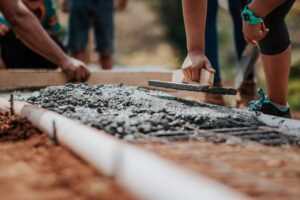Construction on rural land in Andalucia limitedly allowed for single-family homes

In December 2021, the Andalusian Parliament passed the new ´Land Law´ (Ley del Suelo) in Andalusia, commonly called LISTA, for the construction on rural land. One of the most important new features of this law is that under certain circumstances it allows for building permits to be issued for detached single-family homes in the countryside. This is big news for rural property owners as until now building in the countryside was not permitted and all buildings less than at least 6 years old could be sanctioned.
What is the implementation status of this new law for construction and renovation on rural land?
Following the approval of this new law, the Regional Government of Andalusia is working on regulations to implement it, with these being very important for the new law to start being applied. Currently, these regulations are in draft form pending approval and therefore they are still subject to change.
We’re also going to explain -in the last paragraph- the most important aspects of these draft regulations and the new land law, concerning plots on rural land and the possibility to obtain a building permit for detached homes. Here we´ll cover the new aspects affecting homes in the system of Declaration Assimilated out of Ordination, (DAFO/SAFO) as, for the first time, larger refurbishment works will also be allowed on these.
Was it allowed to build on rural land in the past?
The previous law in Andalusia -called LOUA and adopted in 2003- did not allow for the construction of homes for residential purposes on undevelopable/rustic land, the exception being the possibility to build homes related to agricultural, livestock or forestry operations.
However, despite this ban, many homes were built without a building permit, with incorrect permits or with permits later declared void/invalid. In the province of Málaga, in areas such as La Axarquía, the Guadalhorce Valley, the Mijas Sierra or the Ronda area, hundreds of thousands of rural homes were built due to strong demand from foreign buyers from Britain, Belgium, the Netherlands, Sweden, etc.
One of the reasons for this large demand for rural properties in the countryside of Andalucia is also that they were allowed to be inscribed in the Property Registry (Registro de la Propiedad), due to the time elapse and the neglect of the administration to act against these properties. This registration doesn´t make them legal but it does give them a better administrative status which -in combination with lower market prices – makes these homes more attractive to potential buyers.
What will be the future requirements to build on a rural plot?
- The plot may not be subject to any type of special protection, i.e. it must be regular rural land.
- The building must have a distance of at least 25 metres from the border of the plot.
- Also, the land must have a minimal surface which we explain in the next paragraph.
- There must be a minimum distance of 200 metres from other buildings used for residential purposes.
a. What is the minimum surface area for plots to obtain a permit for construction on rural land?
It will be possible to build on legally segregated plots, which may in no case be smaller than 2.5 hectares (25,000 m2) per property. In forest land, the minimum surface area must be 5 hectares. However, the regulations provide for the possibility of amending this minimum surface area through subregional planning regulations. This amendment must be based on the need to fight against the depopulation of rural areas, the promotion of rural development or the green and circular economy. It is certain that this minimum plot area to obtain a building permit will be amended in many municipalities in the medium term.
b. How many square metres am I allowed to build?
The maximum building area cannot exceed 1% of the rural plot or 0.5% in forestall area. However, it is possible for the general urban planning instrument of the municipality to allow constructions and installations that are additional to the home, provided that their total surface area does not exceed that of the home itself.
c. What is the maximum height allowed for construction on rural land?
The maximum height allowed for these homes in rural land is 7 metres.
d. No approval to build if an urban settlement is being formed
An urban settlement, ´asentamiento urbanístico´, is defined as the formation or existence of a group of buildings in a relatively small land area, which would require collective infrastructure or services unsuitable for rural land. The new land law and its regulations prohibit the formation of new urban settlements in rural land and, therefore, do not allow for issuing building permits for homes likely to form a settelement.
The law provides many definitions of what can be interpreted as an urban settlement, some of these being somewhat ambiguous and subject to interpretation with the passage of time. For instance, one of the clearest criteria that make it impossible to provide a permit for a home on rural land is the existence of another 6 buildings within a radius of 200 metres. (These 6 buildings would not include outbuildings in plots within that radius.)
What tax will be due from building in rural land in Andalusia?
The new law has established a compensation provision payable to allow constructions in rural land equivalent to 15% of the material execution budget for detached single-family homes. It is payable upon the building permit being granted to the owner or developer, whether an individual or a company. The regulations provide the possibility for each City Hall to reduce this amount through a municipal ordinance.
Need for prior authorisation to obtain the permit
It is mandatory to request prior authorisation from City Hall, to confirm that it is possible to obtain a building permit on the rustic plot. This prior authorisation procedure must include certain technical and legal documentation about the plot, as well as about the building intended to be built.
One of the most important points of this authorisation is notifying the cadastral and registry holders of neighbouring plots. The neighbouring holders may object to the building, claiming that it would prevent the performance or implementation of regular operations in their plots. This refers to livestock, forestry or agricultural operations since the construction of a home on rural land is considered exceptional.
Approval Town Hall in case of sale
If a period of 6 months has elapsed from the moment that the application was filed and the City Hall has not replied, it will be interpreted as denied. In case the City Hall grants prior authorisation, the owner or developer will have a period of one year to apply for a building permit. Otherwise, prior authorisation must be obtained again. This prior authorisation will allow owners of a plot seeking to sell it with a building permit to carry out this procedure and, once the City Hall approves it, the plot can be sold to a buyer with the guarantee that they will be able to build on it.
Ability to refurbish/renovate homes considered Assimilated out of Ordination (DAFO/SAFO)

The new land law has introduced a significant amendment regarding homes with the status of Assimilated out of Ordination (DAFO/SAFO). The new law allows for these homes to be refurbished and for their structures to be adapted. Previously, these homes were only allowed to engage in minimum maintenance and preservation works strictly necessary to guarantee habitability, health, safety and accessibility. The possibility of carrying out improvements and refurbishments in these rural homes legally opens the door to many owners who have bought a home in the countryside, who have not dared to execute these works to date or who have done so and assumed the risks of sanctions by the Town Hall.
In our daily work as lawyers, providing legal advice during the conveyancing process of rural homes, we see that most buyers wish to carry out refurbishment and improvement works and they will now be able to do so legally with a municipal permit. It is very important to note that, to obtain a refurbishment permit for homes on rural land, these must have a DAFO/SAFO resolution or this procedure should be underway. Without the recognition of Assimilated out of Ordination, it is not possible to obtain any permits for a rural property, either for refurbishment or preservation of the property.
In my opinion, since the type of work that may be carried out in an existing rural home has been extended, having a DAFO/SAFO resolution for this property may be more appealing, as it will enable owners to maintain and improve their homes legally.
Author: Gustavo Calero Monereo, lawyer at C&D Solicitors (Torrox, Malaga)






